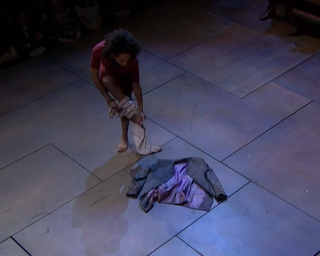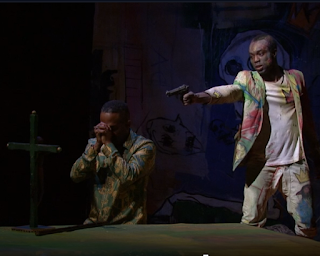Act V, sc ii: There's a divinity that shapes our ends
Today we reach our dramatic, and tragic conclusion.
The final scene begins with Hamlet explaining to Horatio how he has altered the letter from Claudius condemning him to death - and substituting the names Rosencrantz and Guildenstern instead.
They are interrupted by Osric, a courtier, who issues the challenge for a duel with Laertes - in order to settle a bet for the king.
 |
| It probably didn't look like this. |
Moments later, after Hamlet issues an apology to Laertes, explaining that he acted in madness and without 'purpos'd evil' (V.ii.237), the duel begins. It can be seen as another example of a play within a play, a performance staged for a court audience as well as the theatrical one.
Laertes selecting the poisoned foil and Claudius preparing the poisoned drink with a deadly jewel, 'Hamlet, this pearl is thine' (V.ii.284) as planned.
Hamlet, unaware of the plot against him, wins the first points - and Gertrude drinks to his health from the poisoned cup. She offers an odd reaction to Claudius' request not to drink from it. 'I will, my lord, I pray you pardon me.' Does she know what it contains, or is it an ironic accident? Claudius does nothing more to prevent her.
The friendly duel becomes a deadly battle as Laertes strikes the fatal blow but Hamlet ends up with Laertes' sword and returns the wound, so that Laertes is 'justly killed with mine own treachery' (V.ii.313). He confesses the truth amidst Gertrude's collapse and an enraged Hamlet finally seeks his revenge by wounding Claudius with the poisoned sword and forcing him to drink the poison.
Here's Kenneth Branagh going a little off piste with Claudius's death in the 1996 film. It represents just five lines of the play (V.ii.327-332) but there are one or two additional stage directions in this version. It's 40 seconds of cinema that is worth watching for the liberal interpretation of 'wounds the king':
Hamlet prevents Horatio from taking his own life since Horatio can clear Hamlet's name by telling his story after death. Hamlet, rightful ruler of Denmark for a few seconds only names his heir: Fortinbras, ending the feud, and the corruption. The price, though, has been high as the audience gaze upon a corpse-strewn stage, and hear the report that 'Rosencrantz and Guildenstern are dead' (V.ii. 376).
In addition to your own summary and notes,
- How does Hamlet justify his action in condemning Rosencrantz and Guildenstern to death? (Now no longer spontaneous and 'accidental' as with Polonius, but cold-blooded plotting!)
- Hamlet is often accused of inaction. List all his 'actions' here and elsewhere in the play. Hazlitt wrote that Hamlet's 'ruling passion is to think, not to act'. How far do you agree?
- Decide whether you think Gertrude plays a decisive role in her own death or not. Justify your answer.
- Freewrite your thoughts about Hamlet's death and the play's ending.



Comments
Post a Comment